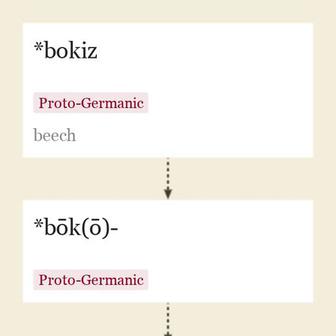Middle English bok, from Old English boc "book, writing, written document," generally referred (despite phonetic difficulties) to Proto-Germanic *bōk(ō)-, from *bokiz "beech" (source also of German Buch "book" Buche "beech;" see beech), the notion being of beechwood tablets on which runes were inscribed; but it may be from the tree itself (people still carve initials in them).
Latin and Sanskrit also have words for "writing" that are based on tree names ("birch" and "ash," respectively). And compare French livre "book," from Latin librum, originally "the inner bark of trees" (see library).
The sense gradually narrowed by early Middle English to "a written work covering many pages fastened together and bound," also "a literary composition" in any form, of however many volumes. Later also "bound pages," whether written on or not. In 19c. it also could mean "a magazine;" in 20c., a telephone directory.
The use of books or written charters was introduced in Anglo-Saxon times by the ecclesiastics, as affording more permanent and satisfactory evidence of a grant or conveyance of land than the symbolical or actual delivery of possession before witnesses, which was the method then in vogue. [Century Dictionary]
From c. 1200 as "a main subdivision of a larger work." The meaning "libretto of an opera" is from 1768. A betting book "record of bets made" is from 1812. The meaning "sum of criminal charges" is from 1926, hence slang phrase throw the book at (1932). Book of Life "the roll of those chosen for eternal life" is from mid-14c. Book of the month is from 1926. To do something by the book "according to the rules" is from 1590s.
Middle English boken, from Old English bocian "to grant or assign by charter," from book (n.). The meaning "write down, record, enter into a book" is from c. 1200. The Old English sense is because the first books in English were records of grants or conveyances of land.
The meaning "to register a name for a seat or place; issue (railway) tickets" is from 1841; that of "to engage a performer as a guest" is from 1872. U.S. student slang meaning "to depart hastily, go fast" is by 1977, of uncertain signification. Related: Booked; booking.
"mass destruction by fire of published material deemed obscene, corrupting, etc.," 1850, from book (n.) + verbal noun from burn (v.). As an adjective, it is attested from 1726 (in John Toland, who was a victim of it).
What an irreparable destruction of History, what a deplorable extinction of arts and inventions, what an unspeakable detriment to Learning, what a dishonor upon human understanding, has the cowardly proceeding of the ignorant or rather of the interested against unarm'd monuments at all times occasion'd! And yet this Book-burning and Letter-murdring humor, tho far from being commanded by Christ, has prevail'd in Christianity from the beginning .... [John Toland, "The History of the Druids," 1726]
also chapbook, 1812, from chap, short for chapman, so called because chapmen once sold such books.
One of a class of tracts upon homely and miscellaneous subjects which at one time formed the chief popular literature of Great Britain and the American colonies. They consisted of lives of heroes, martyrs, and wonderful personages, stories of roguery and broad humor, of giants, ghosts, witches, and dreams, histories in verse, songs and ballads, theological tracts, etc. They emanated principally from the provincial press, and were hawked about the country by chapmen or peddlers. [Century Dictionary]
1178 in Anglo-Latin, the popular name of Great Inquisition or Survey (1086), a digest in Anglo-French of a survey of England undertaken at the order of William the Conqueror to inventory his new domain, from Middle English domes, genitive of dom "day of judgment" (see doom (n.)). "The booke ... to be called Domesday, bicause (as Mathew Parise saith) it spared no man, but iudged all men indifferently." [William Lambarde, "A Perambulation of Kent," 1570]
from late 15c. in reference to various important medieval books with red covers; as "The Peerage," 1788; as "book containing the names of all persons in the service of the state," 1800. Mao's Little Red Book, containing his expressions and dictums, is attested in English by that name from 1967.


